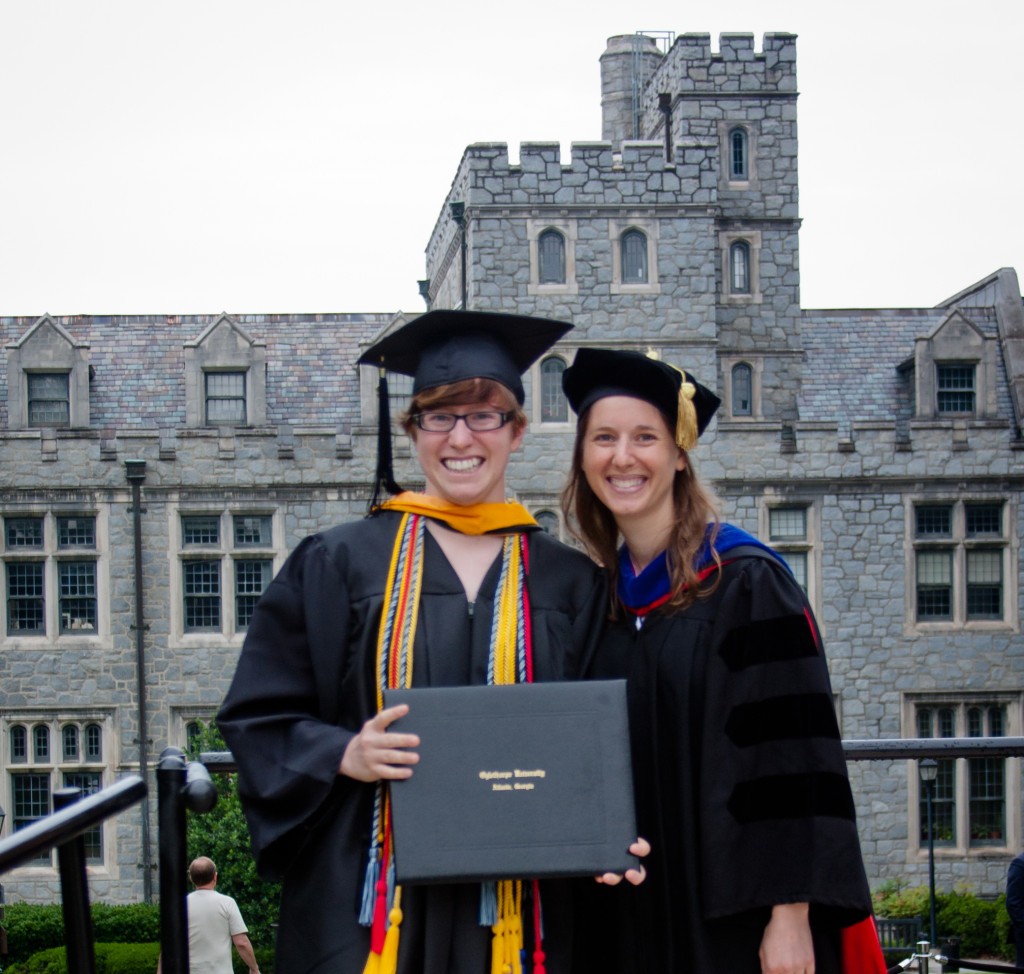
Brittany Weiner ’12 (left) is pictured with her honors advisor and research partner, Dr. Leah Zinner, at the 2012 commencement. Brittany received the Sally Hull Weltner Award for Scholarship, presented annually to the student in the graduating class with the highest grade-point average among those students graduating with academic honors.
No student wants to be just another paper to grade or another name on the roll. At Oglethorpe, the professors are quick to take an interest in their students and their academic success. Dr. Leah Zinner, associate professor of psychology, and alumna Brittany Weiner ’12 epitomize the great things that can happen when faculty and students collaborate on academic endeavors. Their psychology research was featured in the October 2013 issue of the Journal of Homosexuality.
It all started as the primary assignment for the “Advanced Experimental Psychology” course. This class offers students the chance to create a study based solely on a student’s individual interests. Brittany used this opportunity to study transphobia, an emotional aversion to anyone that deviates from societal gender roles,and the predicted readiness of transsexual parents. Brittany invested countless hours into the semester-long research project, lovingly referring to it as her “baby” that she “nurtured from a little seed.”
After submitting her research for consideration, Brittany was invited to present her findings at the Southeastern Psychological Association Conference. There, she won first place for undergraduate research on minority issues for her paper titled “Attitudes Toward Transsexual Parenting.” This success prompted her to explore sharing her study on a higher level.
Meanwhile, Dr. Zinner urged Brittany to push her research even further academically. Throughout her senior year and then after graduation, Brittany continued to work together with Dr. Zinner on the research to make it worthy of being published.
“The ability to collaborate during two years of drafting and publishing and to be “first author” on two papers when I’m one year out of college is amazing,” said Brittany. “Professors are behind you no matter what in order to make you succeed.”
Dr. Zinner believes that part of the equation for success in students’ development is giving them the chance to be independent. “There’s so much growth that happens with a student, from the beginning of the year when they pretty much know nothing, to the end of the year when they’ve done a whole study almost independently,” said Dr. Zinner. “When you work with faculty, you don’t get to witness that kind of growth. That’s why I love working with students.”
Both Dr. Zinner and Brittany attribute a great deal of their success to the special culture at Oglethorpe. Known for its small class sizes, Oglethorpe encourages faculty and students to work together in an environment that is personal and progressive. Within a class of only 10 students, Dr. Zinner was able to devote a generous amount of time to collaborating with Brittany, which directly contributed to their continued research even after the class had ended. Without this, the opportunity to collaborate would have been unlikely.
“I really get to know my students and that makes collaboration that much more fun.” said Dr. Zinner. “I get to know each of them as a person, not just academically.”
Larger research institutions typically don’t offer students the opportunity to conduct research alongside faculty. As an alumna of Emory University, a premier Atlanta research institute, Dr. Zinner finds that Oglethorpe offers immense value in faculty/student collaboration. “
Classes at Emory were taught by graduate students. It was small but the projects we were assigned didn’t have a minimal level of complexity or a novel contribution to the scientific community,” said Dr. Zinner. “The fact (that) you’re getting a faculty member and not a graduate student (at Oglethorpe) means that I’m going to be here to continue to help that student develop their project after their class is over.”
Becoming published scientific authors is no easy feat, but Brittany and Dr. Zinner epitomize the potential when faculty and students come together to collaborate.
“I never thought that my little advanced experimental project would be published or would win an award at a conference,” said Brittany. “The rigor they teach you to have in order to produce a paper that is worthy of recognition in the scientific community is amazing. You can only get that type of support and belief in your work at Oglethorpe.”
